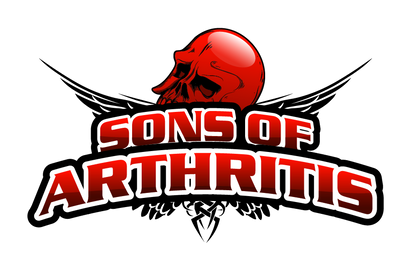
What It's Like to Rehab From a Motorcycle Accident
In my last blog post, I described my traumatic accident, where, at 70 mph, another rider’s bike careened into mine and changed my life forever. I also explained how CBD oil has helped me in various areas, including with easing the pain I still experience.
But, before I found CBD oil, I had to walk the long road of rehabilitation, which included an addiction to hydrocodone.
My Injuries, Surgeries and Physical Rehabilitation
The accident happened in a flash, but fixing the damage to my body was a long ordeal. I was in the hospital for four and a half weeks (a week of which I spent in the ICU). The doctors used six surgeries in just over a week to repair the damage - two of them took over 10 hours each to complete. The pain of getting X-rays after each of these surgeries was excruciating: The technician had to arrange my body in directions it no longer wanted to go.
To replace the skin and muscle torn from my shin (where a gaping hole was left from where I was hit by the other bike), the doctors used a type of reconstructive surgery called a “Free Flap” procedure. Unlike a skin graft, this procedure maintains the blood supply in the tissue through a vein or artery. In my case, the doctors used a 7” X 4” free flap, using muscle extracted from my lat and skin from my thigh to reconstruct my shin.
My other surgeries included:
- A total pelvic rebuild
- The installation of 25 screws, two of which are 10 inches long, tying my rear pelvic bone together, along with five plates that are anchored within my bones
- The placement of a steel rod that extends from my knee to my ankle, along with four screws holding it in place
On top of it all, I was also laid up with two broken ribs.
After my month-long hospital stay, I still had a long way to go. At first, they transferred me to a secondary care facility, but I knew right away that the facility was not what I needed, so I transferred myself into home care three days later. From home, I began the process of trying to walk again, with the help of a lot of physical therapy. For a long time, I couldn’t make it up to our second floor bedroom. Instead, I had to use the makeshift bedroom my wife and daughter had constructed for me on the first floor for three months before I could make it up the stairs.
After my body had recovered, I had one more hurdle to overcome.
My Unexpected Addiction
To manage the pain throughout my ordeal in the hospital, the doctors administered Dilaudid (hydromorphone), an opioid used to treat extreme pain.
Once I was released from the hospital, I was sent home with prescriptions, mainly for hydrocodone, to continue relieving my severe pain as I healed.
I knew it was reasonable to be on such heavy pain meds for a time, but there came a point when it dawned on me that that time had passed: I was hooked. I knew this was the case because, when I tried to decrease the dose, it didn’t help my pain anymore and my body felt off-balance unless I went back to a higher dose. This was a horrible realization to begin with, which was only intensified by the fact that I was keeping my addiction hidden from my wife. I ended up revealing my addiction when it began to have an impact on my moods.
I thank God that my beautiful wife is a Licensed Professional Counselor (LPC). Of course, she immediately understood my issue, because she helps clients who deal with addictions everyday. She recommended that I reach out for professional help, but I had my own way of going about this sort of thing: I was determined to quit cold turkey. After all, it worked for me when I quit smoking back in 2000.
Again, I endured another harrowing ordeal. For three weeks, my body went through so many different physical and emotional effects of coming off a narcotic; I just wanted to crawl into a corner and die. However, it took two months to feel back to normal again.
I am grateful I was able to overcome this addiction; I’ve been clean for almost a year now. Ironically enough, our Hydrocodone T-Shirt is actually one of SoA’s best sellers. It seems I’m definitely not alone in my fight to get off of prescription drugs.
Hydrocodone Addictiveness: A Warning
Prescription drugs have proven more lethal than heroin (in 2017 alone, 15,482 overdose deaths involved heroin). In contrast, deaths resulting from prescription opioids were at 3,442 in 1999, and increased to a staggering 17,029 in 2017, according to the Centers for Disease Control and Prevention.

The government is taking notice of prescription opioid deaths and addictions. In 2014, legislators upgraded products containing hydrocodone from Schedule III up to Schedule II controlled substances. Schedule II is where drugs that have a higher potential for abuse are placed.
Hydrocodone can cause long- and short-term damage to your mind and body. Its effects are similar to that of morphine and heroin, which makes sense, because all of these substances interact with the same area of your brain. Since the drug involves the brain’s reward system, you can easily become addicted. And, once you are addicted, you no longer have the ability to feel happy, expect for when you’re taking the drug.
Conclusion
My addiction to hydrocodone is over, but that doesn’t mean the daily pain is gone. The trick for me has been seeking out an alternative pain management strategy. I’m not alone in this approach.
In a February 2019 study, a program that included group support, acupuncture, mindfulness, massage and gentle exercise was delivered to those who had been prescribed opioids (including hydrocodone). After three months, the participants’ pain levels had decreased by 12 percent and their ability to manage and function during their everyday activities had increased by 22 percent.
CBD oil is the alternative that works for me.
I won’t ever touch hydrocodone again, unless I have absolutely no other choice!
Leave a comment
Comments will be approved before showing up.
Also in News

All You Need to Know About the Electric Motorcycle for Adults

The Best Motorcycle Gear You Can't Live Without



